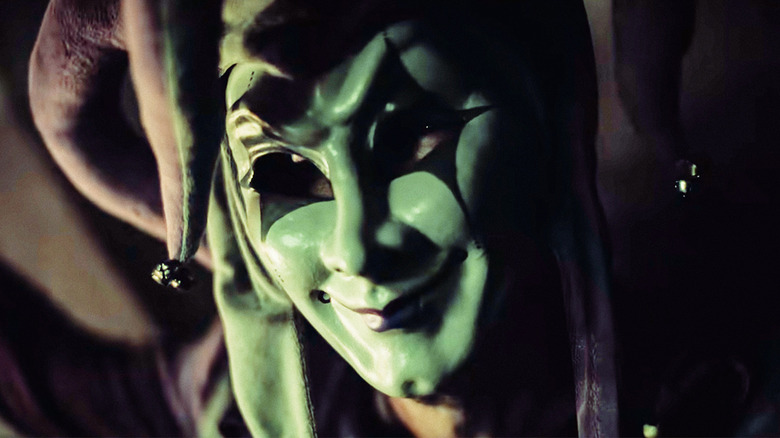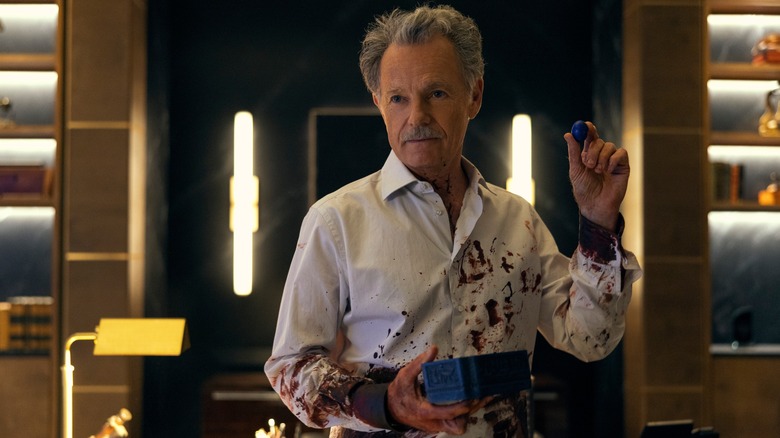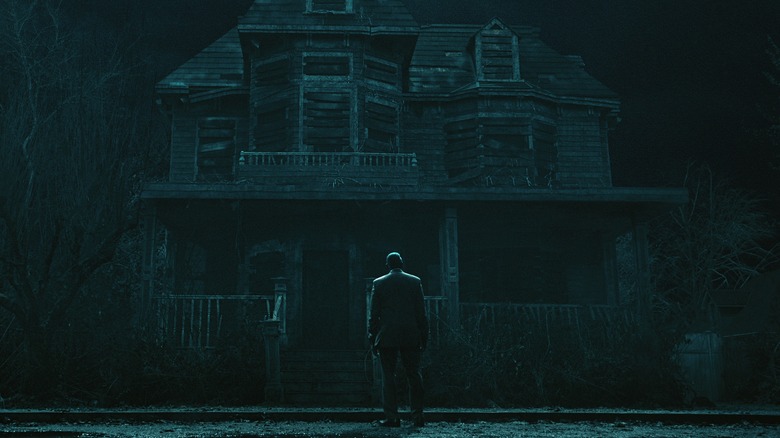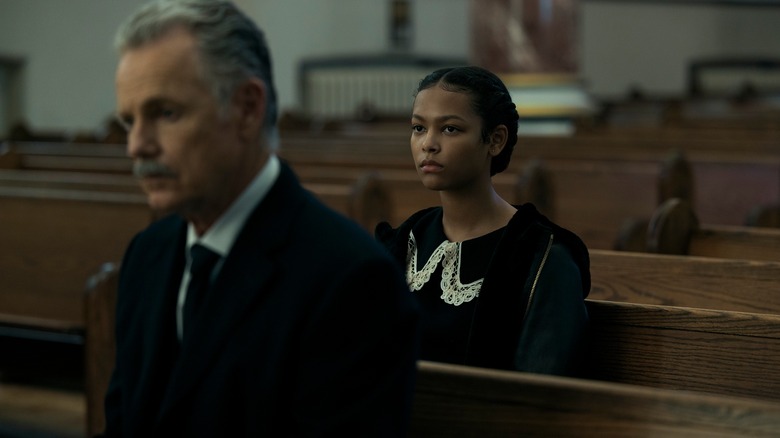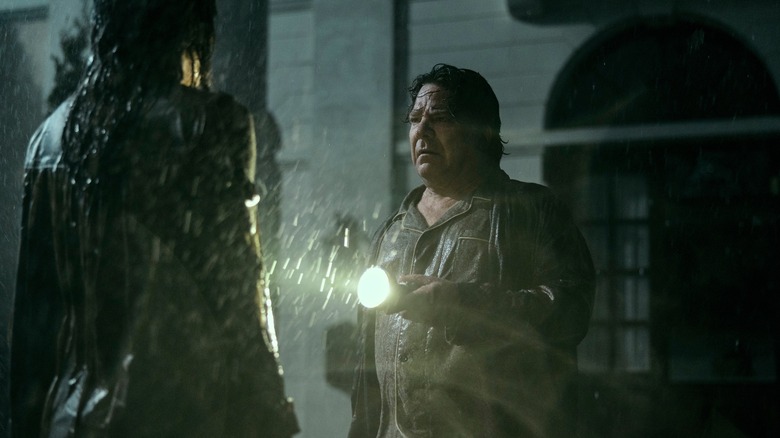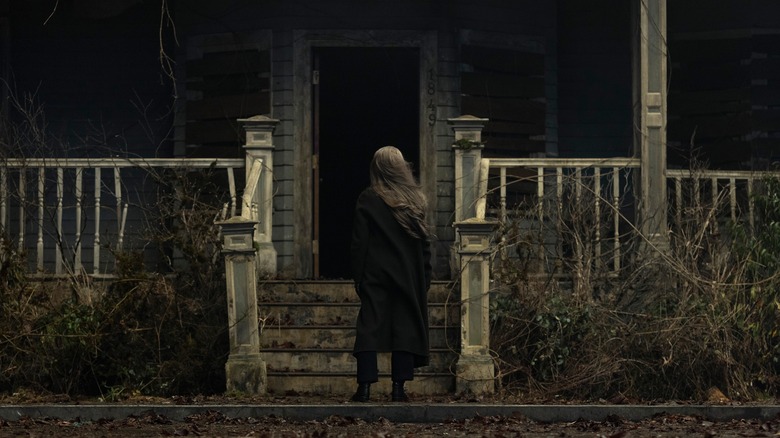The Fall Of The House Of Usher Ending Explained: Evil Things In Robes Of Sorrow
The house of Usher as it appears in Mike Flanagan's Netflix series "The Fall of the House of Usher" is a far cry from the "mansion of gloom" described in Edgar Allan Poe's original story. It definitely has the "gloom" part down, but it's only a humble house at the opposite end of the street from a true mansion, where the young Roderick and Madeline Usher's biological father lives but refuses to acknowledge them. Whereas Poe told the story of an "old money" family, fallen from greatness due to an implied family tradition of inbreeding, Flanagan tells a new money fable of the Ushers' meteoric rise and their grisly downfall.
The series folds in story elements and Easter eggs from many of Poe's works, ranging from the most famous ("The Raven," from which the first and final episode take their titles) to the more obscure ("Berenice," an unpleasant story about an obsession with teeth). Of equal influence is the real-life scandal of the Sackler family, whose crimes have been more literally dramatized in "Dopesick" and Netflix's own "Painkiller." In this adaptation, the sins of the House of Usher are the opioid crisis, and the lives lost as a result of it.
The bill comes due in the series finale of "The Fall of the House of Usher." With all six of his children now dead, Roderick Usher is left with no choice but to face his own end alongside his twin sister — and the true nature of their deal with the mysterious Verna is finally revealed.
What you need to remember about the plot of The Fall of the House of Usher
Amid all the bloodshed and hedonism of "The Fall of the House of Usher," there are some key details that are illuminated when the nature of Verna's deal with Madeline and Roderick is outlined. Verna (whose name is an anagram of "raven") is a devil at the crossroads, but she isn't entirely malevolent; her key motivation for making deals with humans is that she finds their decisions and the consequences "interesting."
The series finale suggests that Verna does have some compassion; she gives Lenore a peaceful death, and seems to regret having to extinguish this last branch of the Usher bloodline. Verna also seems pleased when Arthur Pym refuses to make any bargain with her, thanking him before she says goodbye. It's a moment that pays off a scene from all the way back in episode 2, when Verna approaches Prospero at his party and tells him, "there's still time ... to stop it." There's no stopping his death, of course, but looking back from the finale, it seems clear that Prospero could have had a peaceful death — in fact, all of the Usher children could have — if they'd only made better choices.
Another detail that's important to recall is Madeline's Usher's "immortality collection," made up of Ancient Egyptian artefacts that the pharaohs believed would allow them to defy death and live on through the afterlife. In the penultimate episode of "The Fall of the House of Usher," Madeline's takes another stab at escaping the fate that's coming for her: convincing Roderick to take a would-be lethal overdose of his own drug, Ligadone. Unfortunately for Madeline, there's no wriggling out of this deal.
What happened at the end of The Fall of the House of Usher?
The series finale, "The Raven," resolves two mysteries that have been built up throughout the previous seven episodes: what exactly Roderick and Madeline did on the night they ended up at Verna's bar, seeking to establish an alibi; and the exact terms of their deal with the mysterious stranger behind the bar. In flashbacks, it's revealed that the terrifying jester who has been inflicting jump scares on Roderick (and, by extension, the rest of us) is the slimy Rufus Griswold — whose name is an allusion to Poe's real-life nemesis. Borrowing from Poe's story "The Cask of Amontillado," the young Roderick and Madeline lure Rufus to the basement of the new Fortunato building, poison him with cyanide, and brick him up inside a wall to die slowly — still dressed in his jester outfit.
Verna's deal with the Ushers promised them that they would escape justice for the rest of their lives, and become wealthy beyond their wildest dreams through Fortunato. All it would cost them was the Usher bloodline — doomed to expire along with them. "Let the next generation foot the bill," Verna suggests, and after very little convincing the Ushers agree.
The framing story comes to an end in much the same way that Poe's original story does: Madeline Usher, entombed alive, emerges to take her brother to the grave with her, and their guest escapes as the house of Usher crumbles around them, becoming their grave. But the ending is given a gruesome twist via Madeline's "immortality collection," as it's revealed that Roderick plucked out her eyes and replaced them with sapphires, as well as (presumably) pulling her brains out through her nose using her own ancient iron hook.
What the ending of The Fall of the House of Usher means
There's a memorable adage (of uncertain provenance) that goes something like this: "Blessed is he who plants trees under whose shade he will never sit." It describes the selflessness of taking actions in life whose benefits will only be felt after the person who has planted those seeds is dead. The choice to take such actions, or to not take them, continually determines the shape of the future; as Verna tells Prospero, he is both "consequence" and "consequential."
To flip this analogy on its head, Roderick Usher is like a man who cuts down a tree in order to build himself a house from the wood, knowing that it means future generations will never get to sit in the tree's shade. Verna's deal to "let the next generation foot the bill" is a crystallization of recent intergenerational anger from Gen Z and millennials towards Baby Boomers, for soaking up wealth in their own youth and creating the circumstances for decades of wage stagnation and growing inequality. Madeline Usher alludes to this in her final speech, describing how the machinery of capitalism and politics has been reduced to "cranking out an impoverished workforce, there for the labor and to spend what little they make consuming."
Mike Flanagan can't resist injecting a dose of optimism into his endings, however, and the conclusion of "The Fall of the House of Usher" suggests that some good might still be done with the Usher legacy, now that the Ushers themselves are wiped out. Through the Lenore Foundation and the Phoenix Foundation, many lives will be saved — though not enough to counterbalance the pyramid of death built by Roderick Usher.
The immortality drive
Though Roderick Usher is quick to sign away his bloodline in exchange for freedom and fortune, the bargain is like a lot of business deals: made with the expectation that a loophole will be found later to free them from their obligations. After all, Roderick is told he will live for another 40 or 50 years. That's plenty of time to find a way out.
In "The Fall of the House of Usher," both Madeline and Roderick are searching for ways to avoid paying Verna. Madeline has her immortality collection, and her AI project designed to allow a person's mind to live on after death. Meanwhile, Roderick is pursuing his own means of escaping death by funding Victorine's heart technology — which, as we see in episode 5, "A Telltale Heart" — can force a person's heart to keep pumping even after they're dead. It's little wonder that they believe it's possible to defy death, given that the twins' own mother clawed her way out of her grave.
This, too, reflects a real-life state of affairs. As of January 2023, around 500 people have been cryogenically frozen, at a cost of tens or hundreds of thousands of dollars each. In 2012, Paypal co-founder Peter Thiel told CBS that he believes "death is a problem that can be solved." Along with other billionaires like Amazon founder Jeffrey Bezos and Google co-founder Larry Page, Thiel has been funneling millions into companies promising greater longevity and, eventually, immortality.
"Death is the great equalizer," psychiatrist Rami Kaminski explained to the New York Post in a feature on the immortality race. "The only thing that can bring [these men] down is death and you can not do anything about it. They are literally scared to die and immortality is the ultimate defense."
'Look on my Works, ye Mighty, and Despair!'
There is another path to immortality, and it's one that Roderick ultimately resigns himself to: living on through legacy. Roderick and Madeline both separately state the same beliefs to comfort themselves towards the end: that they are not responsible for the damage done by Ligadone, because they never forced people to take it; and that regardless of its nature, they have succeeded in changing the world and leaving behind a legacy.
The value of that legacy is dismissed — first by the ghost of Annabel Lee when she confronts Roderick at her children's funeral and marvels at "the poverty of you"; then, later, by Auguste Dupin as he visits Roderick Usher's grave and declares himself to be "the richest man in the world" as he goes home to his husband, his children, and his children's children. He also chooses to rob Roderick of the legacy he hopes to leave behind: his confession. It's what Dupin has been chasing for decades, but he ultimately leaves the tape recording behind on Roderick's grave.
It's a moral that will be familiar to readers of Percy Bysshe Shelley's poem "Ozymandias" (or Vince Gilligan's TV show "Breaking Bad"). The poem describes the broken-down remains of a statue commissioned by "Ozymandias, King of Kings," whose pedestal commands, "Look on my Works, ye Mighty, and Despair" — an epitaph rendered ironic by the fact that "Nothing beside remains. Round the decay/Of that colossal Wreck."
With the possibility of immortality gone, Roderick can only comfort himself by giving Madeline a burial worthy of a queen — Queen Twosret, to be precise, whose death marked the end of the Nineteenth Dynasty of Egypt. Because Verna's bargain means that neither twin can die before the other, Madeline was alive throughout all the Ancient Egyptian rituals her brother performed on her. Now that's a fate horrifying enough to be worthy of Poe.
